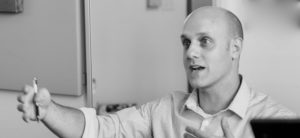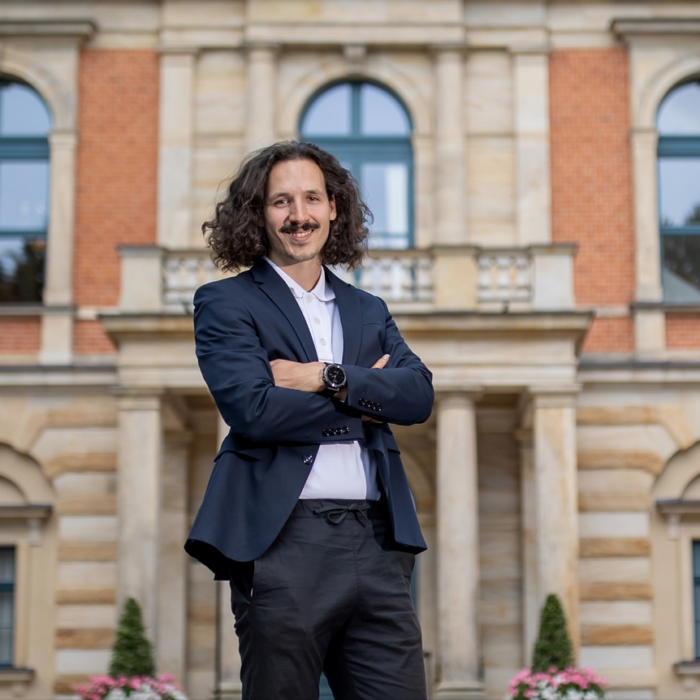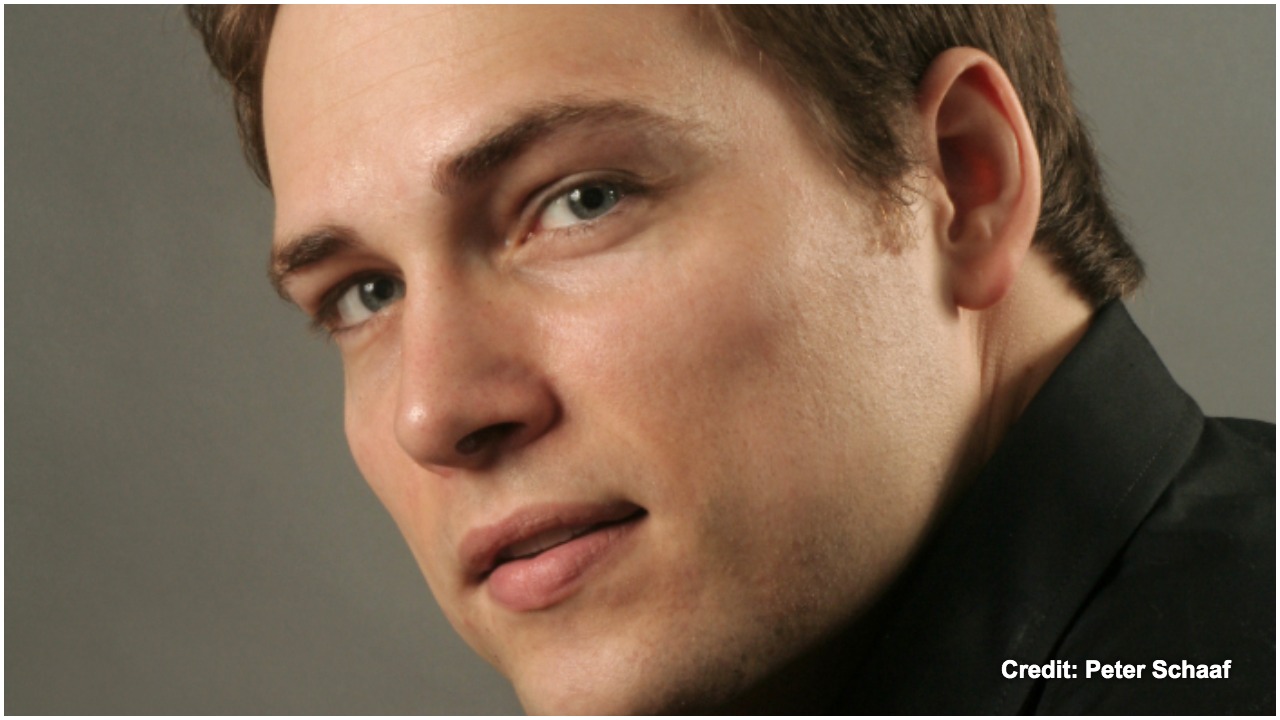
Q & A: Composer Evan Mack on His New Album ‘The Travelled Road’
By Chris RuelOn March 26, award-winning composer Evan Mack’s new album of art song, “The Travelled Road” released worldwide on all major streaming platforms.
The recording came about organically after Mack invited mezzo-soprano Megan Marino and pianist John Arida to Skidmore College in New York State to noodle around and explore some ideas. Marino and Arida had worked together, and with Mack, previously. The mezzo, accompanied by Arida, would often perform Mack’s pieces in recital. Joining the composer, pianist, and singer at Skidmore was cellist James Platte, a colleague of Mack’s at the college. When asked to take part in the music-making, he jumped at the chance. During our interview, Mack showered nothing but praise on his colleagues for their incredible musicianship.
As Mack discusses, the fun and joy of musical exploration never changed during the short time the three were together at Skidmore, but their goal did. The composer recognized he had an album on his hands if they could lay down a few more tracks—in just one day. And that’s how “The Travelled Road” came to be.
What followed was a year-long process of engineering, fundraising, and preparing an album for release during a pandemic. The artists’ grit and determination, a theme explored in “The Travelled Road,” was put to the test, but the result is a recording Mack is extremely proud of. It’s an album he listens to over and over because of the brilliant performances captured on the unexpected album.
OW: What drew you to composition?
Evan Mack: I started composing around the age of 13 and started piano when I was seven, and actually, all of my initial training and degrees are in piano performance. The more piano I learned, the more I would connect with the composers I was playing, and then mimic them. It was a great way to learn how to compose.
At 13, I was writing musicals, and then when I got to college, I had friends available, so a lot of the music I wrote at Vanderbilt was chamber stuff. I had friends in string quartets and flute ensemble and things like that. Then I started writing for a chorus as the music director at church.
I kind of fell into the opera world through a story about sister Dorothy Stang. I said, “This sounds like an opera,” and I started doing research. Just as a labor of love, I wrote my first opera (“Angel of the Amazon”)—the libretto and the music—and was very lucky that Encompass New Opera Theatre premiered it and did 13 performances. I thought, “Okay, this is something I could get used to.”… like 13 performances is a common thing. People kept asking, “What’s next?” That’s when I realized there was something there.
Theater and voice have always drawn me, so I started looking into writing more operas. I paired up with librettist Joshua McGuire, and we’ve been writing operas ever since.
OW: Who among composers do you feel are kindred spirits?
EM: Samuel Barber was one, especially in graduate school. Playing all of his piano works was thrilling and quite informative. Something very funny was that in high school, I studied with a teacher who had fled the Soviet Union. If you closed your eyes, I sounded like a Soviet pianist playing Prokofiev, Rachmaninoff, and Shostakovich. I learned my American roots when I started studying in college and graduate school. John Adams, Corigliano, and Copland were my go-to composers, and that’s where I branched off and fell in love with that musical language.
OW: Your bio mentions you believe “that opera should be theater grounded in climatic expression that delivers-larger-than-life stories and music that harnesses the full athletic thrill of singing.” Tell me about that.
EM: Because opera elements can carry the narrative—you’ve got the visual, you have the words, and you’ve got the music, you want to make sure that they’re taking turns in the right moment; that’s the thrill. For example, there is nothing more exciting than when a singer is performing, and the text might be this grandiose saying, but it’s really this haunting thing or vice versa; the music is so grandiose, but words are contradicting or supporting it. When that pairs up with beautiful visuals and the climax in the music, there’s nothing more thrilling than live theater.
OW: What was the inspiration for recording “The Travelled Road?”
EM: I was fortunate that Megan Marino and John Arida were performing my song cycle, “Preach Sister, Preach,” in recitals. And so they said, “Hey, Evan, do you have anything else.” I sent Megan a bunch of my stuff for mezzo-soprano. Her husband, Michael Mayes, was championing a piece I wrote, “A Little More Perfect,” and she asked if I would arrange it for mezzo.
Part of this was just going to be, “Come on up to Skidmore and let’s explore, we can record some things, try some things out,” and it just became this magical moment that was incredible and freeing. I thought, “I’m so glad we got this recorded, and we still have another day. If we record the other songs, we have an album here.” That’s how it organically grew and came alive instantly. I was so thankful we captured that.
OW: There is a theme of persistence throughout the album which took a year to produce, so you had to draw on your grit. What were some things you had to persist with?
There were a couple of things. There was the change in mindset from let’s just explore to “I think we should record and release this.” Instantly, things got heightened because now we’re not exploring, but we’re still making music, and we’re still having a good time; if it happens, great. Then it was about the length of editing, changing things and making sure everything flowed as it was supposed to, and raising money—as all things are in the classical world.
With the world shutting down, everything slowed down because we had to go remote. I was fortunate to have done the main mix with the sound engineer right before the world shut down. There was a lot of back and forth, fine-tuning, and making sure we had enough money.
OW: “The Travelled Road” has 22 tracks. In ordering the pieces, what was your thought process?
EM: The only one I definitely knew was “The Road and the End,” which I wrote specifically for Megan and John. When I knew they were coming, I didn’t want to squander the opportunity. I thought this song has to be the last track because it’s a grand summation, it’s putting an exclamation point on grit and determination. If you look at all the previous tracks, you’re dealing with the determination to overcome at some level. With “Secret Ocean,” it’s a determination to do the right thing, or with “A Little More Perfect” and “Preach Sister, Preach,” there’s a determination for social change. With Dorothy Stang, it’s environmental change and the rights of the poor. So, the “Road and the End” sums that up.
It worked out both musically and thematically, and I wanted to have Jameson Platte at the cello in the beginning and end as a nice way to bookend the album.
OW: You use a wide range of text—from Supreme Court opinions to the words of many iconic women throughout history. How did you find these texts?
EM: With the “Three Reflections of Sister Dorothy,” I wrote the words, but they were from arias from “Angel of the Amazon.” Even though I curated all the words together to make the arias, they were quotes from sister Dorothy because I had access to her letters from 1969 to a week before she was killed and reflections by sisters who lived and worked with her in the Amazon.
The others like “A Little More Perfect,” dealing with marriage equality, came from a paragraph in the Supreme Court ruling by Justice Kennedy. I thought it was absolutely beautiful poetry, so I chewed on that for a couple of days. I wrote it out, read it out loud or quietly to myself, and then composed the piece within about an hour. There are things that like that serve as a spark.
“Preach Sister, Preach,” grew out of the first women’s march. I was watching it on TV and seeing a lot of my friends on social media. I wondered what iconic women would think of this moment, and what have they said about such moments in the past? I gathered probably 45 or 50 quotes and then stepped back and saw patterns. I recognized how humor could be a great way to get their points across. Using humor was kind of judo-flipping the power dynamic.
I’m always attentive to whether a text could be an art song or ways it could be an opera. It’s a little unhealthy because I can’t really enjoy reading a poem. But ultimately, those are the things that speak to me, and part of it is I’ve had a lot of fun. For example, with “Preach Sister, Preach,” some quotes are one sentence, so many of the songs are 30 seconds. There’s one quote, “Women want love to be a novel, men a short story.” I kept drawing up that first part of the quote; “women want… women… women want love… love to be novel…” and then it builds, builds, builds, “… a man short story.” Boom. The music punctuates that humor even further. That’s what led to that particular quote being selected.
OW: You said it’s hard to read poetry and sometimes even prose without thinking musically. In my world, some writers plan everything out in advance and follow that plan to a T. Others are more intuitive and allow the story to evolve organically. Is there something analogous within the realm of composing?
EM: That is a great question. There are two ways I’ll approach a text; one is absolute inspiration, so with something like “A Little More Perfect,” reading the paragraph by Justice Kennedy was an absolute inspiration. There was just this sense of like I’m going to stop everything and dive into this because I know there’s a song there. The second way is that I have an idea, like “Preach Sister, Preach,” or I have a song cycle that’s not on the album on famous quotes about parenthood, which I strung together. After searching for texts with a general idea, it’s a quick, impulsive yes/no—yes that will work, no that won’t work.
With others, I’ll be staring at a blank page and only set two or three lines or two or three words. I’m chipping away at it, walking away from it, and coming back to it. For me, the exciting ones are the pieces that come from inspiration, You look back and ask, “How did that happen?”
OW: You’ve worked with Megan before, and you worked with John before, but what about with James?
EM: He’s my colleague at Skidmore College. He’s an awesome cellist, and I was like, “I have two great artists coming in, and I’m going to write some stuff for cello want to join?” He said, “Absolutely!” So, he’s on two tracks.
John is so phenomenal on this album for two reasons. One is the delicate insight and support he provided Megan. Because they collaborated a ton, I saw the ease with which they worked together. Then, on some of the piano stuff, he let it rip like the way I would.
After I sat down and listened to the album, John was the first person I called. I was so thrilled with his playing and said, “Please play everything I’ve written.” He is an extraordinary artist, and with Megan, one of the best of the best, hearing them as a duo is amazing.
OW: If you put yourself in Megan or John or James’ shoes, how would you describe what it’s like to collaborate with you as the composer?
EM: One of the first things I will tell people is that I am a middle child, so my entire life has been trying to make sure everyone was cool and feeling good. I say that because there’s this weird idea people believe about composers, and it’s that every note or measure is sacred. With me, the singer might say, “You put the ritard on beat four, but I took it at three. Is that okay?” I’ll respond with, “It’s not exactly what I wrote, but please do more of that!”
It’s jarring because, in the classical and opera world, you’re trying to get perfection from the note on the page, yet on the other hand, I would hope that it’s comforting too, in the sense of like, “You know how you wanted to go way higher and longer, I love that!”
Megan did something in “Secret Ocean,” something she wanted to revisit, but I said, “No.” I brought out my computer and said, “See these two measures? They are now officially changed. I rewrote it because I want it to sound just as sang it.”
OW: So, do you now expect other singers to perform the piece as revised for Megan?
EM: That’s a good question. There are two things I would say. One, I think singers should have the license to take those liberties because that’s one way the music stays living and breathing. Even more so, when working in opera, there’s so much collaboration and change. My understanding is that if the music is not intuitive for the singer to understand after the first pass in the first rehearsal, they’re uncomfortable. Instead of focusing on telling the story, they’re concentrating on: What’s the rhythm? What’s the note? Where’s my voice position?
Between the draft and the workshop process that I’ve done so often, I know right away when I need to change something because I want the singer to be comfortable and to tell the story.
OW: What is your biggest personal takeaway from the recording process?
EM: I’m very lucky and fortunate that these wonderful artists took the time to learn my music, execute it, and captured it so beautifully.



